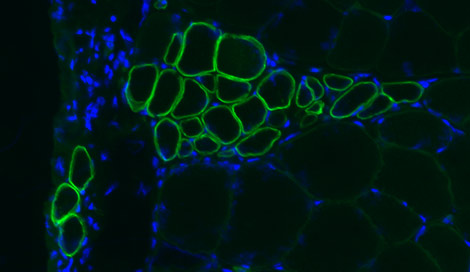Investigator: Maura H Parker PhD
Category: Research - Translational

Great advances have been made to understand the cause of FSHD, and the mechanism behind the disease. Currently, researchers indicate that improper expression of DUX4 in FSHD-affected muscle is the cause of the disease. However, to further understand FSHD and test potential therapies, we need to develop an appropriate pre-clinical animal model.
Mice are the most widely used animal model, as they are easy to handle and breed. However, mice do not have the DUX4 gene in their genome, suggesting that expression of DUX4 protein within mouse muscle may not fully reproduce the human disease.
Therefore, we propose to generate human FSHD-affected muscle within mice. We will do this by transplanting muscle stem cells from FSHD-affected individuals into the regenerating muscle of mice. Based on our current studies, we expect to generate a muscle within the mouse that is human-derived. These mice will be important for studying the disease in the context of an individual, yet sparing patients the pain of multiple muscle biopsies. Most importantly, these mice will be essential for pre-clinical testing of potential therapies.
By developing a protocol to enhance the reliability of myoblast expansion from muscle biopsies we will greatly improve cellular and animal models of FSHD and other muscular dystrophies.






Connect with us on social media